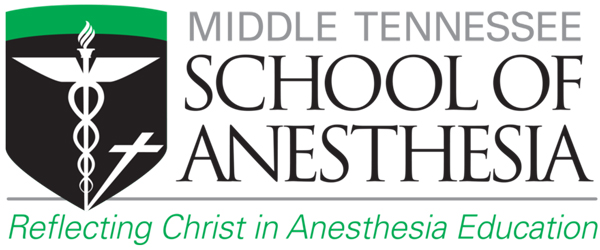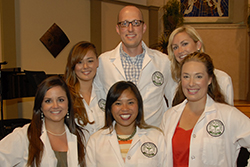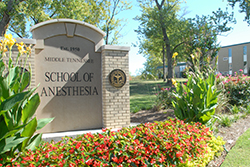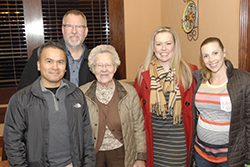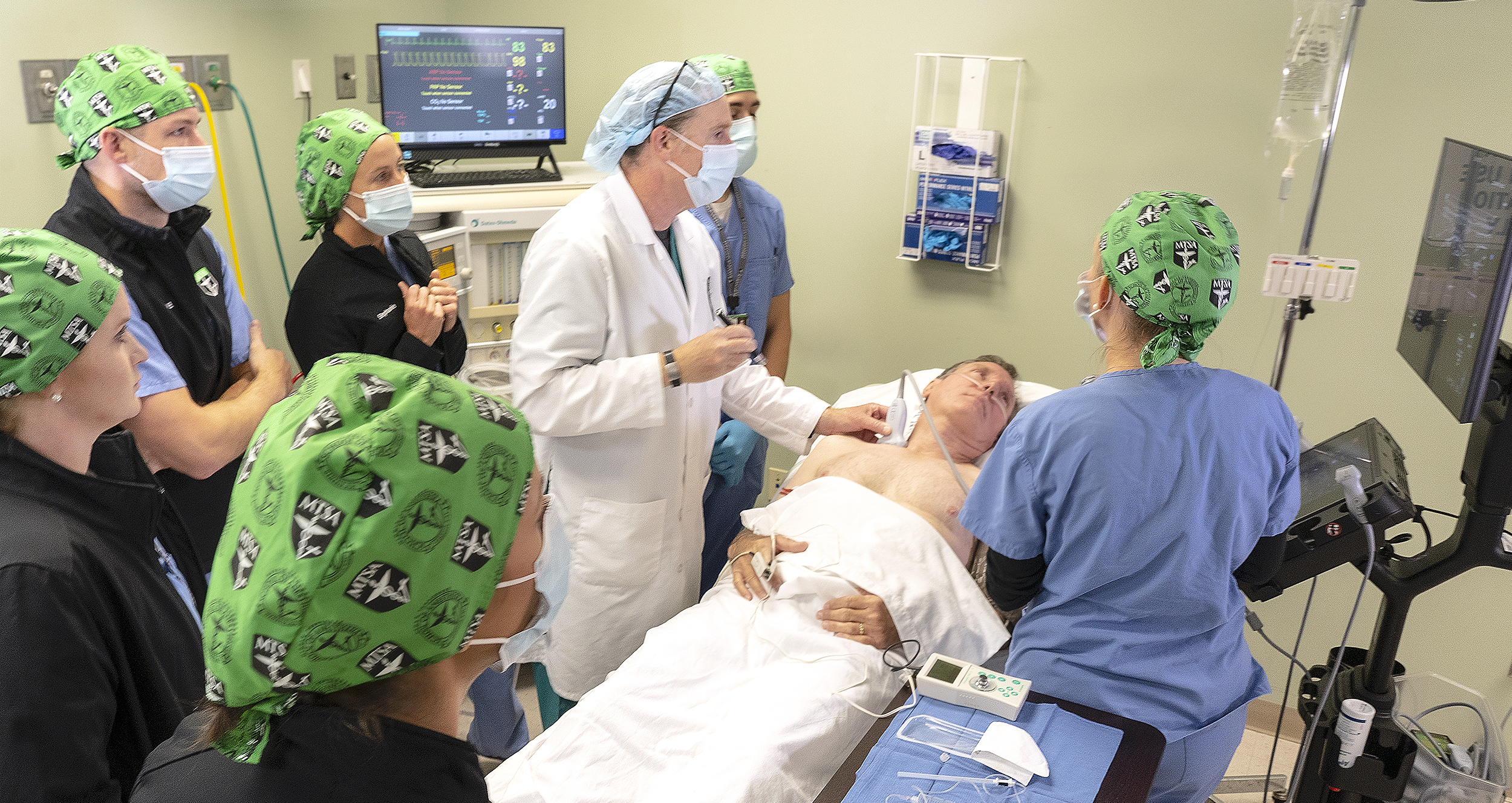
Acute Surgical Pain Management Fellowship -- For CRNAs only
As the only Fellowship of its kind for CRNAs in the United States accredited by the Council on Accreditation of Nurse Anesthesia Educational Programs (COA), the Acute Surgical Pain Management Fellowship (ASPMF) is a 12-month hybrid program designed to expand a CRNA’s regional anesthesia skills and provide the tools necessary for incorporating an acute pain service into their practice. The curriculum incorporates online education, live synchronous events with expert faculty, on-campus hands-on cadaveric intensives, and clinical rotations to provide a well-rounded educational experience.
ASPMF Application Cycle and Deadlines for Fall 2024
- Application open Sept. 1, 2023 – March 1, 2024
- Interviews begin following application period
- Semester starts Sept. 3, 2024
Apply Here >>>
Quick Navigation:
Program Overview»
Application Checklist»
Program Faculty»
Evaluating and Awarding Academic Credit Policy»
Neuraxiom»
ASPMF Student Handbook»
Program Overview
CRNAs = Part of the Solution to a Growing Need
The management of acute pain is an ever-evolving specialty. The opioid crisis has highlighted the need to better manage patients throughout the perioperative period. The ASPMF at MTSA equips CRNAs with the advanced skills needed to address pain, from multimodal therapies and opioid-sparing strategies to advanced regional anesthesia techniques including continuous catheter placement and management.
The Format
The Fellowship uses a hybrid format, with a combination of on-campus intensives, online (didactic) education, cadaveric workshops, and clinical experiences with experienced preceptors to teach providers the necessary skills to manage acute surgical pain and improve patient outcomes throughout the perioperative period.
The Curriculum
The program is divided into three semesters over 12 months. Each semester includes a didactic and concomitant clinical course that builds upon the previous one. Fellows begin with an overview of pain assessment and introduction of essential regional anesthesia techniques while practicing skills at cadaveric workshops. This is followed by an advanced regional anesthesia techniques course and clinical rotations where fellows can hone their skills. Finally, fellows learn how to evaluate the literature, develop and implement protocols to optimize patient outcomes, and incorporate educational, legal, professional, and business applications into their acute pain practice.
Topics of Study
- Psychosocial, spiritual, and cultural dimensions of acute surgical pain
- Non-allopathic considerations for acute surgical pain management
- Neurophysiological response to pain
- Assessment and evaluation of the patient with acute surgical pain
- Advanced regional anesthesia techniques
- Implications of pharmacogenetics on acute surgical pain management
- Nonsurgical Pain Management Applications
- Legal, ethical, and professional issues of acute surgical pain management
- Implementing your own acute pain service
ASPMF Course Sequence
| Semester | Instructor | Course | |||||||||
|
Semester 1 |
|
Dr. Falyar | ASPMF 700 Foundations of Acute Pain Management (APM) (3 Hrs.) | ||||||||
| Dr. Falyar | ASPMF 710 Essential Ultrasound Guided Techniques in APM (3 Hrs.) | ||||||||||
| Dr. Hooge | ASPMF 720 Clinical Practicum I (1 Hr.) | ||||||||||
|
Semester 2 |
|
Dr. Falyar | ASPMF 730 Advanced Ultrasound Guided Techniques in APM (3 Hrs.) | ||||||||
| Dr. Falyar | ASPMF 740 Principles of Pharmacology in APM (3 Hrs.) | ||||||||||
| Dr. Hooge | ASPMF 750 Clinical Practicum II (1 Hr.) | ||||||||||
|
Semester 3 |
|
|
|
Dr. Falyar | ASPMF 760 Clinical Teaching & Specialty Topics in APM (3 Hrs.) | ||||||
| Dr. Hooge | ASPMF 770 Clinical Practicum III (1 Hr.) | ||||||||||
Course descriptions can be found in the ASPMF Student Handbook or by clicking on the individual course name links above.
The Fellowship relies on an internationally recognized group of content experts who serve as didactic lecturers and clinical preceptors. Learn more about them here: Fellowship Faculty»
Fellowship Highlights:
- An international, multidisciplinary faculty
- Instruction in over 50 regional anesthesia techniques
- Clinical sites nationwide offering a wide range of experiences
- Development and incorporation of ERAS protocols into practice
- Essential Point-of-Care Ultrasound Education (workshop included)
- Specialty clinical rotation in transitional pain management option
Admission Requirements
Applicants are accepted on an ongoing basis during the application cycle, with classes beginning in the Fall. The ASPMF Screening Committee will review applicants to determine eligibility to interview with the ASPMF Admissions Committee. Prospective candidates must meet the following criteria:
- Practicing CRNA with at least two years of experience and an unencumbered license
- Attendance at an Essentials of Ultrasound Guided Regional Anesthesia (USGRA) Cadaveric Workshop within one year of applying
- Experience in performing USGRA blocks and access to ultrasound scanning capabilities
Request Information
Our offices are open Monday through Thursday from 8 a.m. – 6 p.m. CST. To request more information or schedule a campus visit, please call us at 888-353-6872 or email Mandy Kelly, the program coordinator, at mandy.kelly@mtsa.edu.
Accreditation
The Acute Surgical Pain Management Fellowship is accredited by the Council on Accreditation of Nurse Anesthesia Educational Programs (COA), 222 S. Prospect Ave., Park Ridge, IL 60068; (847)655-1160. The fellowship’s term of accreditation is October 2021-October 2026 at which time it may choose to seek continued accreditation. This certificate is not an education prerequisite for an advanced practice nursing license.
Start Your Application
Application Checklist
As part of the application process, the following documentation is required:
- Application and Fee via NursingCAS
- RN License
- APRN License
- Official academic transcripts from every institution of higher learning attended, including transcripts for all non- degree-seeking academic courses taken since high school
- NBCRNA Certification (must be current with expiration date displayed) AANA Membership
- Nursing School Diploma
- BLS & ACLS certificate
- Current CV
- Three (3) letters of reference from:
- professional peer
- CRNA supervisor
- Chief Medical Officer of Anesthesia Group
- Proof of Personal Health Insurance
- Certificate of completion from an Essentials of USGRA Cadaveric Workshop within the past year Copy of driver’s license
- Personal Statement (please address the following information):
- Introduce yourself and your background.
- Describe your current clinical practice, including the types of nerve blocks you administer and their frequency.
- Explain the strategies you plan to use to effectively manage your workload during the program.
- Discuss how you envision applying the knowledge and skills acquired during the ASPMF program.
- Ultrasound Portfolio
- Two (2) Ultrasound images with labeled anatomy (example below)
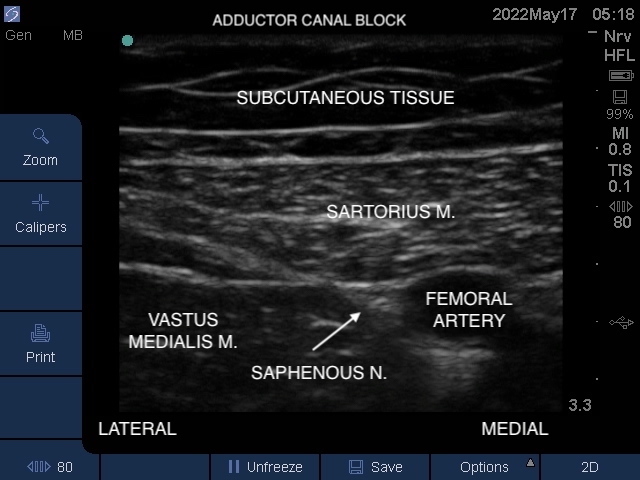
Interested in the Acute Surgical Pain Management Fellowship? Sign up to receive updates»


